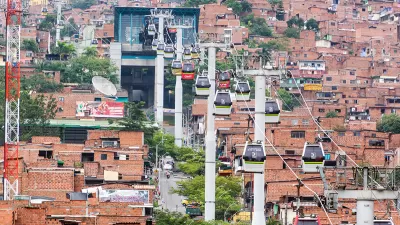The "sanctuary cities" that President Trump has repeatedly characterized as incubators of crime are generally safer than other cities, according to a new analysis of FBI crime data.

"The 'sanctuary cities' that President Trump has repeatedly characterized as incubators of crime are generally safer than other cities, according to a new analysis of FBI crime data," reports Christopher Ingraham.
Ingraham is reporting an analysis of FBI crime data by Tom Wong, a professor of political science at the University of California at San Diego, which "finds that counties designated as 'sanctuary' areas by ICE typically experience significantly lower rates of all types of crime, including lower homicide rates, than comparable non-sanctuary counties."
The Center for American Progress, a progressive think tank, published the analysis.
A few more details of Wong's findings: "In smaller counties and even rural areas, crime rates were also lower for sanctuary areas," with the exception of "medium metros and counties on the fringes of large metro areas, which had slightly higher crime rates if they were sanctuary areas."
The study includes a lot more on the analysis into sanctuary cities, and the now debunked talking points that helped President Donald Trump get elected.
FULL STORY: Trump says sanctuary cities are hotbeds of crime. Data say the opposite.

Alabama: Trump Terminates Settlements for Black Communities Harmed By Raw Sewage
Trump deemed the landmark civil rights agreement “illegal DEI and environmental justice policy.”

Planetizen Federal Action Tracker
A weekly monitor of how Trump’s orders and actions are impacting planners and planning in America.

The 120 Year Old Tiny Home Villages That Sheltered San Francisco’s Earthquake Refugees
More than a century ago, San Francisco mobilized to house thousands of residents displaced by the 1906 earthquake. Could their strategy offer a model for the present?

In Both Crashes and Crime, Public Transportation is Far Safer than Driving
Contrary to popular assumptions, public transportation has far lower crash and crime rates than automobile travel. For safer communities, improve and encourage transit travel.

Report: Zoning Reforms Should Complement Nashville’s Ambitious Transit Plan
Without reform, restrictive zoning codes will limit the impact of the city’s planned transit expansion and could exclude some of the residents who depend on transit the most.

Judge Orders Release of Frozen IRA, IIJA Funding
The decision is a victory for environmental groups who charged that freezing funds for critical infrastructure and disaster response programs caused “real and irreparable harm” to communities.
Urban Design for Planners 1: Software Tools
This six-course series explores essential urban design concepts using open source software and equips planners with the tools they need to participate fully in the urban design process.
Planning for Universal Design
Learn the tools for implementing Universal Design in planning regulations.
Clanton & Associates, Inc.
Jessamine County Fiscal Court
Institute for Housing and Urban Development Studies (IHS)
City of Grandview
Harvard GSD Executive Education
Toledo-Lucas County Plan Commissions
Salt Lake City
NYU Wagner Graduate School of Public Service





























